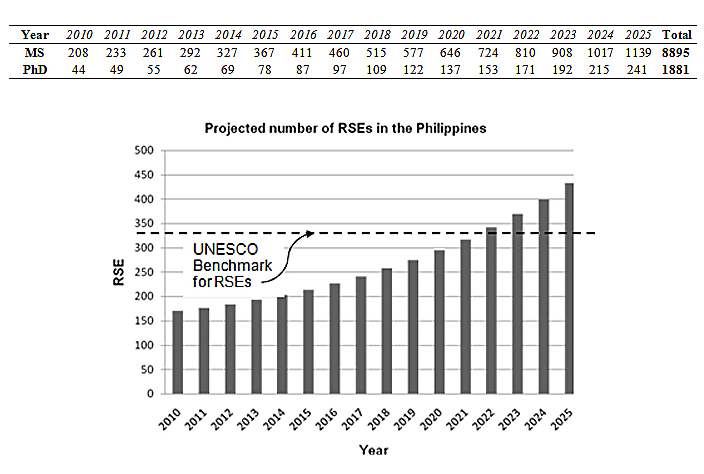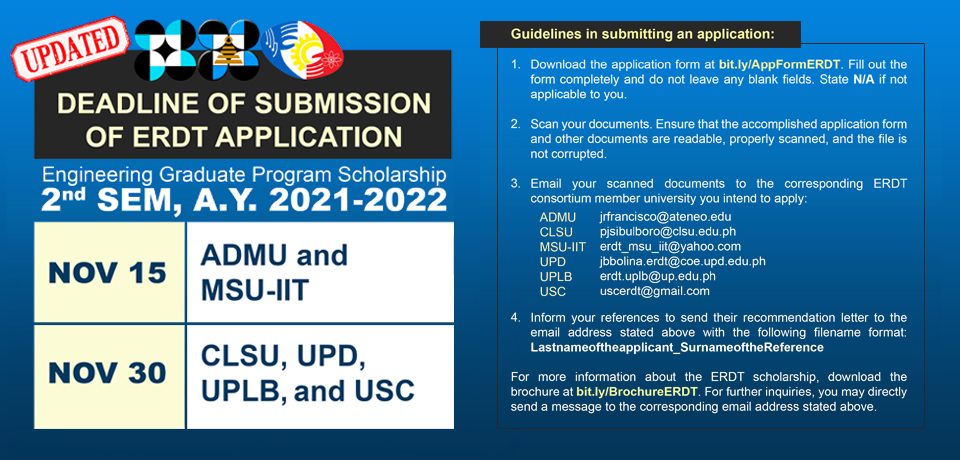ERDT 15 year Plan
The need to develop our technology-based research capability through engineering graduate research training has never been more urgent. We need engineers with advanced degrees to make S&T work for Filipinos: from disaster mitigation to poverty alleviation, from agriculture to semiconductor industries; ensure a sustainable environment and affordable energy for the future; and produce indigenous technologies to better our lives. This is the essence of the ERDT Program.
The effect of globalization has exposed our vulnerability to foreign technology dependence and the lack of technological research in the country. While we continue to produce engineers who are trained to use foreign-developed technologies, our Asian neighbors have turned their focus on producing graduate research engineers who are trained to develop and create such technologies. This is a realization that graduate level research can usher in high-value engineering and economic development. South Korea and Taiwan have recognized this 40 years ago. Both countries are now leading technological centers and economic powers in the world.
Vietnam has recently embarked on a massive man-power development[1]. Over the last nine-years, from 2000-2009, Vietnam has sent more than 2,100 Ph.D. candidates and 1,600 masters abroad. The government of Vietnam plans to send a total of 10,000 Ph.D. candidates trained overseas. It is not surprising then that Vietnam produces more graduate research engineers than the Philippines. In fact, most of our ASEAN neighbors such as Thailand, Malaysia, and Singapore, far outpace us in the number of research engineers.
The need to develop our technology-based research capability through engineering graduate research training has never been more urgent. We need engineers with advanced degrees to make S&T work for Filipinos: from disaster mitigation to poverty alleviation, from agriculture to semiconductor industries; ensure a sustainable environment and affordable energy for the future; and produce indigenous technologies to better our lives. The continued implementation of the Engineering Research and Development for Technology (ERDT) will address the lack of highly trained research scientists and engineers (RSEs) and R&D activities in engineering in the country. The ERDT, through the consortium of 8 universities, with mature graduate programs in engineering, should be able to generate within reasonable time a sizeable chunk of the necessary number of RSEs and engineering R&D required for national development and provide the human infrastructure supportive of local R&D.
The Consortium is needed to bootstrap the various engineering programs in the graduate level. The specializations in each university will be developed in accordance with the identified needs of technology-based industries. These universities have strong ties with industry, ensuring synergy between academe and industry.
Based on the absorption capacity of the Consortium, the viability for us to reach the UNESCO benchmark of RSEs will be realized by a human resource development plan that offers generous scholarships for engineers. With the intended yearly intake of ERDT scholars as shown in Table 1, and with the assumption that ERDT will contribute a quarter of the research manpower for the country, the Philippines would be able to reach the UNESCO benchmark on the 12th year of the Program. This is graphically illustrated in the Chart below. If the potential for multiplier effect of each research graduate in the academe is factored in, it is possible that the UNESCO benchmark can be achieved in a shorter period of time.
The plan to accept new members of the ERDT Consortium to Engineering Schools who are able to attain the minimum requirements for ERDT accreditation will further accelerate the period by which we can attain the UNESCO benchmark.
The investment needed for engineering graduate scholarships over the next 15 years is PhP 16 Billion. These include local graduate scholarship, faculty development and the sandwich program.
[1]http://www.nesovietnam.com/home/news-events/news-archive/2010/vietnam-plans-to-send-1-000-phd-followers-abroad
Table 1: Planned yearly intake of M.S. and Ph.D. scholars in ERDT up to 2025



